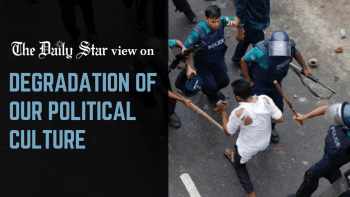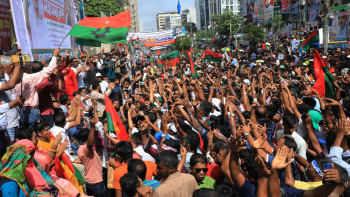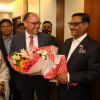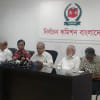Violence cannot be the only language of politics

The political deadlock we find ourselves in has been festering in the background for a very long time. The ruling party's expected opposition for BNP's demand for an election-time nonpartisan interim government is escalating the situation to the brink of chaos. And yet, we see no visible attempts at dialogue or de-escalation from either side.
In fact, it may be fair to say that there doesn't seem to be much thought or tact behind the ruling party's actions at all. Whether it be an acute case of groupthink or a desperate attempt to maintain party control, the current AL rhetoric seems almost entirely aimed at their dedicated supporter base. They seem to be ignoring the fact that a large segment of voters will not be loyal to any one party, instead opting to vote strategically depending on current circumstances and future predictions. In political science, these voters are called "swing voters." We are a two-party state for all practical purposes, and so who the winner will be almost always comes down to who can turn the most swing votes on Election Day. Needless to say, expecting to turn swing votes based on voters' sense of gratitude for past development work is not a savvy political strategy to build a campaign on.
The true fuel behind BNP's current momentum is the wide-scale public disapproval of the government's handling of rampant corruption, misuse of law, and general disregard for human rights. However, instead of trying to win back the trust of those who have become disillusioned, the incumbents seem to only be responding with force projection. The turnouts at the opposition's rallies clearly indicate a large voter base who disapprove of the current regime's policies and actions. But is the current regime even listening to them? The time is now ripe for targeted policy reforms and proactive public statements that address the main concerns of all people of Bangladesh. Instead of doing any of that, AL has allowed the opposition party to dictate the narrative. The AL response to the BNP rhetoric (of restoring voting rights to the common people) has been to try and paint the BNP as a party of "terrorists" who are apparently only concerned with the destruction of Bangladesh. This, of course, is a total political non sequitur, which does not resonate with the demands of the common people at all. Labelling the other side as "evil" is undoubtedly a worrisome course of action for the future of a democratic nation.
Awami League has to bite the bullet and admit that there are serious concerns in people's minds about whether a free and fair election is impossible under any one political party. Historical precedent is not on their side. However, it must be stated firmly that this is not the issue of any particular political party in Bangladesh. It is an issue for every single political party in Bangladesh. Despite the hollow claims made by our ministers during meetings with foreign diplomats, the truth of the matter is that, for the last decade, democracy has not been an option on the ballot table. Right now, as the system stands, the people of the Republic of Bangladesh have no real choice regarding who gets to be their leader. All political parties of our great nation have under-delivered on the promise of a democratic Bangladesh, which our heroic freedom fighters had fought and died for. Instead of delivering on democracy and the rule of law, those who were and have been in power opted to bend the laws and make new laws, all to ensure that their political party could remain in power at the time. Therefore, even if BNP manages to get elected in the next term, if this issue remains unresolved, they too will face this roadblock and the people of Bangladesh will suffer.
One of the key reasons so many developed nations are expressing interest in Bangladesh's election is because they are assessing whether Bangladesh is truly stable and democratic enough to be considered for greater roles in the UN mechanism, as well as on the world stage. With multiple high-level visits from the US, an EU election exploratory mission, and election-related observations from all our biggest Western investors and development partners, these matters did not take shape in a vacuum. The world is keeping an eye on Bangladesh.
For there to be actual change, there needs to be a drastic overhaul of the system. And the change must start with the way elections are held. History has shown that technocrats and intellectuals alone cannot restore democracy in our nation. The will to restore democracy must be political, and it must stem from the people. For democracy to exist, the people need to demand it without fear, and politicians must be held accountable for whatever promises they make. And if politicians fail, they must account for their failure in the halls of our democratic institutions. Violence, rebellion, and uprisings cannot be the ways to take back power.
Unfortunately, our history so far shows that major political shifts have only occurred as a result of violent uprisings on the streets. How can this be the precedent for a modern democratic Bangladesh that aims to step out of the third world and begin to chart a course towards the first? One of the key reasons so many developed nations are expressing interest in Bangladesh's election is because they are assessing whether Bangladesh is truly stable and democratic enough to be considered for greater roles in the UN mechanism, as well as on the world stage. With multiple high-level visits from the US, an EU election exploratory mission, and election-related observations from all our biggest Western investors and development partners, these matters did not take shape in a vacuum. The world is keeping an eye on Bangladesh.
The Awami League has a real opportunity to set Bangladesh on the right track. Changes to the term limit and the introduction of a bicameral parliament can easily be preemptively executed by the ruling party, which would not only deflate a significant portion of the momentum behind the BNP's demands, but would also send a message that they are listening to the people. Compromise can be a crucial first step in the dialogue process and can bring about positive change. However, this cannot take place if politics devolves into primitive stick fights on the streets. It is high time for politicians to put down the sticks and start talking compromise, for all our sake.
Zillur Rahman is the executive director of the Centre for Governance Studies (CGS) and a television talk show host. His Twitter handle is @zillur

 For all latest news, follow The Daily Star's Google News channel.
For all latest news, follow The Daily Star's Google News channel. 











Comments